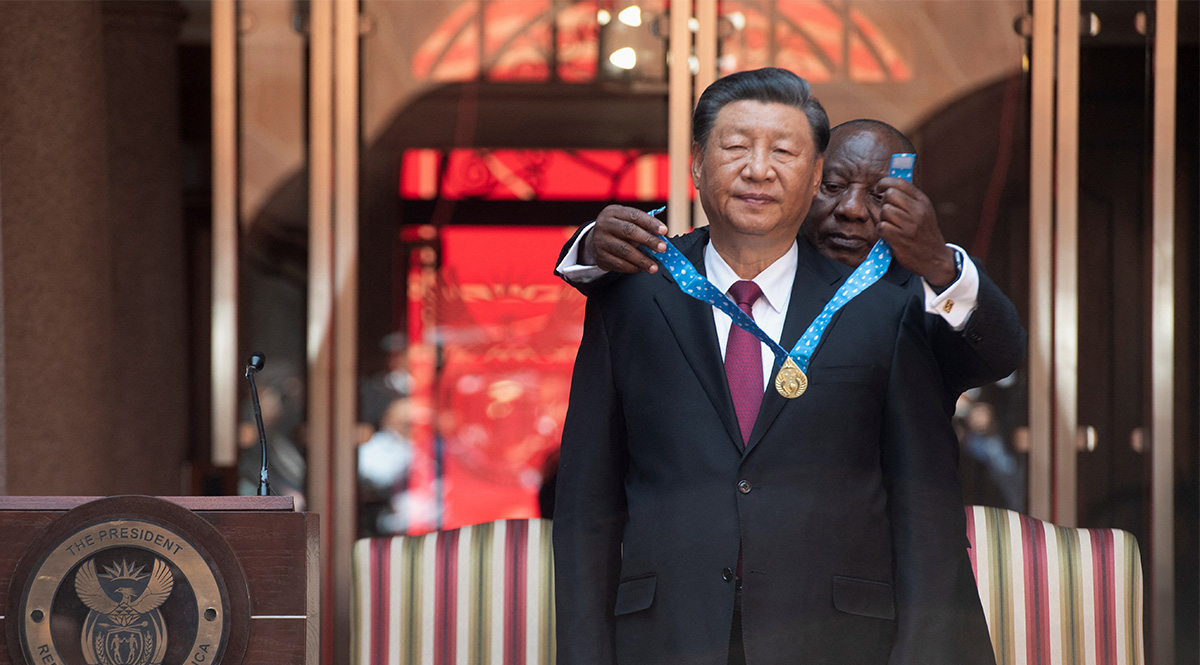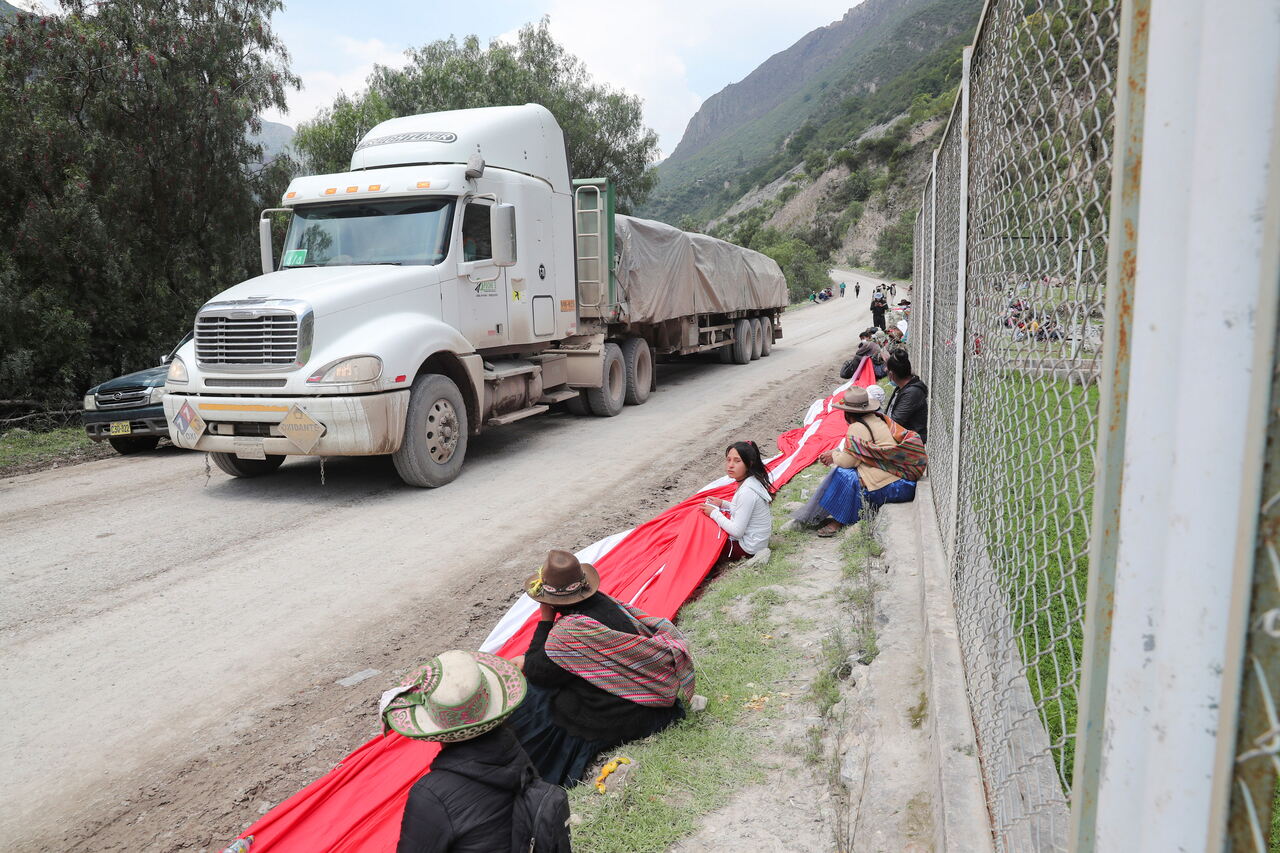China Embracing a Global South Strategy
China wants to be seen as a key partner of the countries of the Global South in their socioeconomic development. Such a positive image is intended to strengthen China’s international position at the expense of the West. China’s offer includes economic support and the empowerment of developing countries in various forums, for example, the UN and WTO. The diversity of countries in the Global South, as well as China’s limited capacity to act, reduces the scope for their cooperation. The West’s response to the Chinese actions should include increasing the role in global governance of developing states that respect a rights-based international order.
 ALET PRETORIUS / Reuters / Forum
ALET PRETORIUS / Reuters / Forum
The term “Global South” is used to describe a group of countries that are diverse in terms of culture, politics, and other things. They are characterised by a low level of socioeconomic development and a sense of an inadequate role in international institutions, which they perceive as a result of colonial legacies, unjust Western policies, and other factors. China refers to this sense of injustice by defining itself as the largest developing country and part of the Global South. China is shaping relations with this group both through multilateral formats, for example with African and Arab countries, modification of the operation of the Shanghai Cooperation Organisation (SCO) and the expansion of the BRICS platform from January 2024, as well as changes in the operation of the Belt and Road Initiative (BRI).
China’s Narrative and Objectives
The Chinese offer of cooperation with the Global South is focused on three areas: development, security, and in making changes to the global governance system. These are symbolised in the Global Development Initiative (GDI) and the Global Security Initiative (GSI), announced in 2023 by leader Xi Jinping and promoted by China as the basis for changing the international order.
China pledges investment commitment and development assistance to developing countries, as well as cooperation in combating terrorism and stabilisation (as is the case with diplomatic cooperation agreements with Samoa in 2022 or military cooperation with the Maldives in March this year). China is also trying to present itself as a country that takes the interests of developing countries more into account than the West. Han Zheng, China’s vice chairman at the UN General Assembly in 2023, emphasised the need to change global governance in line with phrasing from the GDI and GSI. Chinese Minister Wang Yi called for the inclusion of African states in the UN Security Council in April 2023, emphasised further by the Chinese ambassador to the UN during the debate on Security Council reform in May 2023. The demands in this regard are part of China-Russia cooperation to limit the West’s ability to push for, among others, support for Ukraine at the UN. Chinese proposals for developing countries are not without political requirements, although unlike the EU or the U.S., they do not, for example, concern international law and democratisation. They are also tailored to the specifics and capabilities of the partner country. China expects, among other things, support for its position in the Human Rights Council (e.g., regarding the situation in Hong Kong, Xinjiang, and Tibet) and other UN bodies and agencies. They also assume, for example, that its partners will support Taiwan’s subordination to China, as the authorities in Pakistan, Cambodia, Serbia, and Hungary did after the January elections on the island.
Implementing the Pledges
China’s offer to the countries of the Global South is pursued both in multilateral formats and bilaterally. In 2000, the Forum on China-Africa Cooperation was established, in 2004, the China-Arab Cooperation Forum was inaugurated, and in 2014, the China–Community of Latin American and Caribbean States Forum (CELAC) began its work. China also treated the so-called “16+1” initiative established in 2012 and aimed at Central European countries, including Poland, as a platform for cooperation with the Global South. However, this changed with the withdrawal of several European countries from the format (it is now the “14+1”).
China presents the Global South’s demands at the G20, as do Brazil and India. The Chinese authorities are also active in the G-77, a group of developing countries gathered in this format since 1964, at the meetings of which (e.g., in January 2024) China advocates, among other things, WTO reform.
The BRICS platform (which has included China, Russia, India and Brazil since 2006 and South Africa since 2010) has also become an instrument for strengthening relations with developing countries, with five new members joining in 2024. As part of BRICS, The New Development Bank, with capital of $50 billion, has been operating since 2015 (each country gave an equal contribution). The Asian Infrastructure Investment Bank (AIIB, international in nature but controlled by the Chinese) was also to be an instrument used in relations with the Global South, as well as the Silk Road Fund (worth $40 billion) created by Chinese state-owned banks. However, the above institutions do not contribute to a significant increase in the use of the yuan in international transactions, and thus the dethronement by the Chinese currency of the dollar in the coming years. The SCO remains dysfunctional due to Sino-Russian differences, and the expansion of the BRICS is mainly for propaganda purposes, as differences of interest between the group’s members prevent them from working together effectively.
Developing countries’ cooperation with China in many cases increases these countries’ debt and repayment problems. Central to this is the lending to their public institutions by Chinese export banks, which was more than 80% greater than the World Bank’s support between 2008 and 2021. China’s policies also exacerbate the corruption of local elites and authoritarian tendencies, and investments often result in environmental devastation (this was the case in the context of the Las Bambas copper mine in Peru, or the Lamu power plant in Kenya). China’s involvement is more geared towards building dependency of the local authorities and economy on it. Between 2001 and 2020, China’s share of Sub-Saharan African countries’ trade increased from 4% to 25%. Most developing countries have high trade deficits with China and are increasingly economically dependent on them. In this context, actions similar to the activity of Brazil, which has, in the last six months, initiated more than a dozen investigations into unfair trade practices by China, may become more frequent.
Conclusions and Outlook
China’s offer is intended to consolidate a group of developing countries around the Chinese vision of changing the international order. China recognises the problems of the EU and the U.S. (stemming, for example, from Russian aggression against Ukraine) and the criticism by the countries of the Global South of EU and U.S. policies. Therefore, such actions not only include competition with Western states but also, for example, with Russia in the Central Asian region. Combined with the narrative that China provides effective security and development assistance, the country wants to create the impression of a gradually integrating group of partners under its umbrella. This is served by, among other things, the narrative of a growing role for the BRICS after its enlargement. China’s actions are not so much to promote the economic development and political subjectivity of the countries of the Global South, but to gradually make them dependent on China. Among other things, this is supposed to give greater support to Chinese initiatives, for example in the UN, and to reinforce China’s rhetoric about its significant role as an actor stabilising the international situation and changing the global order for the benefit of developing countries. The reaction of Global South partners to the Chinese offer is mixed, but they mostly declare support for the Chinese demands. However, they do not so much share the negative vision of the international community popularised by China, but rather seek to use Chinese “patronage” to negotiate with the U.S. and the EU on issues such as support for sanctions on Russia and the implementation of investment projects.
China’s demands in relations with the Global South are calculated to undermine, among others, the international community of values in the West’s relations with democratic developing states. This also applies to China’s claims of changing the European security architecture (in cooperation with Russia), which it claims to be supported by the Global South. China is using the negative experiences of developing states in relation to U.S. policy (e.g., the 2003 attack on Iraq) or, to a lesser extent, of EU states to its advantage. Hence, China’s anti-Western demands (often replicating Russian themes, e.g., in the context of the war in Ukraine) are positively received by the societies and political elites of these countries.
Part of the West’s response to China’s policies with respect to the Global South may be to support the greater empowerment of developing countries in the system of global governance. Proposals for UN reform, cooperation on climate change, and in other areas should deliberately take into account the perspective of the Global South, while emphasising the need to respect international law, also in the context of China’s and Russia’s actions. There is a need for the United States and the EU to respond actively to the demands of the Global South regarding, for example, cooperation in the security sphere, including stabilisation in the Middle East. China’s offer is limited in this region, among other reasons, by its still insufficient power-projection potential.



(1).jpg)

